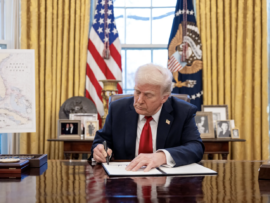
It will now cost tech employers $100,000 to hire workers originating from outside the United States. On Friday (Sept. 19), President Donald Trump signed a measure requiring such a payment with every H-1B visa application, which companies submit to bring in foreign workers for specialty occupations.
The new measures intend to curb the displacement of American workers, address national security risks, and stop companies from undercutting US wages with cheaper foreign labor, according to the administration. A White House fact sheet uses the tech industry as an example of a sector being impacted by these issues.
It claimed that the number of overseas employees working in STEM doubled between 2000 and 2019; however, the total number of employees in the sector increased by only 44.5%, suggesting that US workers were being outnumbered. Government statistics do show that foreign workers currently make up nearly 20% of the US STEM workforce.
“The H-1B program is creating disincentives for future American workers to choose STEM careers, which threatens our national security,” the fact sheet says.
The White House also links the accessibility of foreign talent by tech companies to their rounds of layoffs. It cites two unnamed companies that have had 5,189 and 1,698 H-1B applications approved this year, respectively, while laying off 16,000 and 2,400 US-based employees.
Initially, restructuring announcements were attributed to correcting overstaffing following the pandemic-driven demand surge; however, more recently, they have been linked to efficiency gains from artificial intelligence. Some companies have even explicitly cited AI when announcing job cuts. TechRepublic has reported on layoffs this year at Microsoft, Scale AI, Amazon, Salesforce, and Duolingo.
Prior to the new law, the US charged only a $215 registry fee for an H-1B application, but companies would pay thousands more through legal fees and other add-ons. Only 65,000 new visas are accepted each year, plus an additional 20,000 for those with advanced degrees from US universities, and they are awarded in a lottery system. The companies filing the application must pledge that they cannot find an American worker to fill the position.
A statement from India’s Ministry of External Affairs said that the $100,000 fee “is likely to have humanitarian consequences by way of the disruption caused for families” and stressed that both countries have benefited from “skilled talent mobility and exchanges.”
Barney Hussey-Yeo, founder of UK-based AI startup Cleo AI, told TechRepublic he had received over 1,000 messages from highly skilled professionals considering relocating from the US since the H-1B announcement. “Computer Science graduates from the world’s top universities now working at elite tech companies,” he said. “The UK should do everything possible to become the default destination for this world-class talent.”
Employees at big tech firms were left scrambling by sudden visa fee rules
After some confusion around whether the $100,000 payment would be required annually, sparked by remarks made by Secretary of Commerce Howard Lutnick, Press Secretary Karoline Leavitt clarified on X that it would be a one-time payment, applicable from the upcoming lottery cycle, and necessary only for new visas, not renewals or current visa holders.
Unfortunately, by that time, workers at Amazon and Microsoft had already been advised to abandon their overseas vacations and business trips and return quickly to the US to avoid potentially incurring a $100,000 fee for reentry. These companies received the first- and third-highest numbers of H-1B approvals in the US this year, at 10,044 and 5,189. Others in the top 10 include Meta, Apple, and Google.
Some workers are calling on their employers for more protection during the turmoil. Speaking outside the Google office earlier today, Parul Koul, the President of the Alphabet Workers Union, said: “These decisions have been made with no input from us, no consultation, whether with US-born workers or immigrant workers. If there are problems with the visa program, there should be a real and thoughtful process to reform it, not to suddenly throw hundreds of thousands of people’s lives and jobs into chaos.”
All US-based tech companies, big and small, could be impacted by the new policy
The new fees present a slap in the face for big tech companies that rely on foreign workers for highly skilled roles like software engineers. A number of them, including Apple, Google, IBM, Texas Instruments, and Nvidia, have pledged US expansion to curry favour with the president and avoid expensive new policies. Trump has been using export tariffs to stoke the domestic tech industry, threatening bespoke rates for semiconductors and iPhones.
But smaller companies will likely be hit even harder because “early teams can’t swallow that tax,” Garry Tan, CEO at venture capital firm Y Combinator, wrote on LinkedIn. The American Immigration Council said that the new fee “shrinks our talent pipeline” on Bluesky, which aligns with a letter from the National Venture Capital Association earlier this year, noting that H-1B visas “provide valuable work experience and widen the pipeline of potential immigrant startup founders.”
However, the H-1B program has not been without criticism. A 2020 study by the Economic Policy Institute found that most H-1B employers pay migrant workers below market wages, and Tesla has been specifically accused of using this practice to underpay workers. This is despite the fact that companies that apply for them must attest to paying the worker the same as they would a US counterpart.
OpenAI and Nvidia are among the American companies that committed to $42 billion in technology investments in the UK last week.
Source of Article



